13 Jan 2012
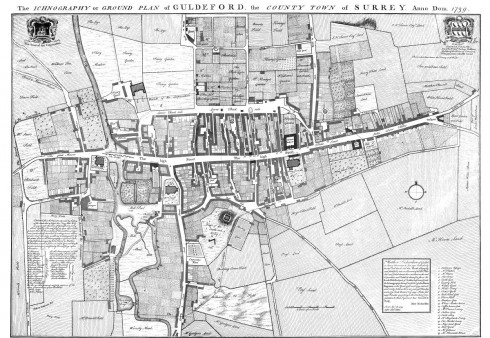
Today I’d like to share a map with you (click on it and it will magically fill your screen), and I’m hugely grateful to Geri Smyth for giving me this. It is a map of the town of Guildford (or Guldeford as it was then) in 1793. Regular readers will know I love a good map, and I have spent a fair while poring over this one. There are a couple of things I love about it. Firstly, it is the most amazing piece of draughtsmanship. It is a thing of extraordinary beauty in a way that Googlemaps can only dream of. The way its laid out, the calligraphy, the attention to detail, are beautiful in a way very few people could recreate today. But what is so extraordinary, upon closer inspection, is how it captures what it looks like when food grows everywhere. Think of it, if you like, as Incredible Edible Guildford, circa. 1739.
Read more»
9 Jan 2012
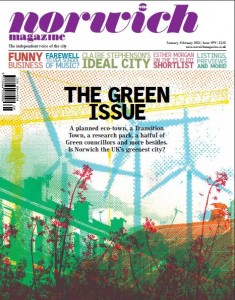
Here’s a great article from the latest edition (‘The Green Issue’) of Norwich magazine, to whom I am very grateful for permission to republish in full. You can also download the pdf of the article here with more of Tony Buckingham’s excellent photos here.
Close to home
In November, Transition Norwich celebrated its third birthday. Sabine Virani investigates a green initiative that is part of a global movement yet focuses on local need, local interest and local resources.
Read more»
4 Jan 2012
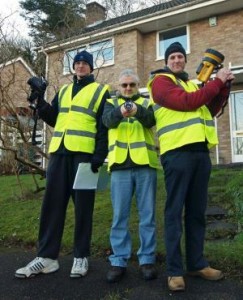 Welcome back to Transition Culture, and a Happy New Year to you. We’ll kick off with our round-up of Transition for December. We’ll start with a few stories of Transition groups working on energy efficiency and fuel poverty which, even though this has been the UK’s mildest winter for many many years, is still a big concern for many people, especially as energy prices continue to rise. TT High Wycombe have created a Warm Homes Team (see right) who have taken to the streets with their council loaned thermal imaging equipment to address winter fuel poverty.
Welcome back to Transition Culture, and a Happy New Year to you. We’ll kick off with our round-up of Transition for December. We’ll start with a few stories of Transition groups working on energy efficiency and fuel poverty which, even though this has been the UK’s mildest winter for many many years, is still a big concern for many people, especially as energy prices continue to rise. TT High Wycombe have created a Warm Homes Team (see right) who have taken to the streets with their council loaned thermal imaging equipment to address winter fuel poverty.
Read more»
14 Dec 2011
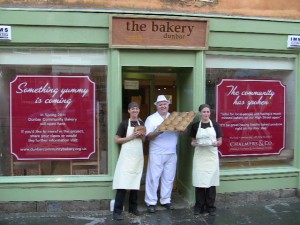
The newly opened Dunbar Community Bakery.
I spent a fascinating afternoon on Monday at an ‘Economic Summit’ (nowhere near as glamorous as it sounds) for Members of South Hams District Council and West Devon Borough Council. The meeting was called to update councillors on the strategic thinking within the councils in terms of the economic development of the area and to hear their views on it. Three communities were invited to present to the councillors the work they were doing to regenerate their economies, and Totnes was one of them. What I want to do in this post is two things simultaneously. I want to give some reflections from that meeting, but also give a review of ‘The Portas Review’ (“an independent review into the future of our high streets”) which was published yesterday. Together they give a sense of the two deeply different narratives that were on show at the Summit, the dangers that their incompatibility presents, as well as the opportunities that emerge.
Read more»
14 Dec 2011
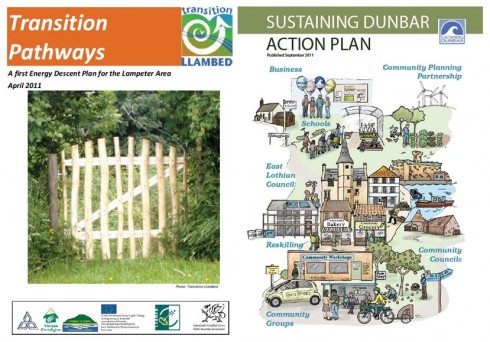
Like buses, you wait for ages for Energy Descent Action Plans to come along, and then two come along at once. This month sees the publication of two new EDAPs, from Llambed in mid-Wales, and Dunbar in East Lothian, Scotland. For a crash course in EDAPs and a taste of those published thus far, see this ingredient from The Transition Companion. These two high quality pieces of work represent two communities taking the idea of an EDAP and rooting it to their place, their community, their challenges.
Read more»






